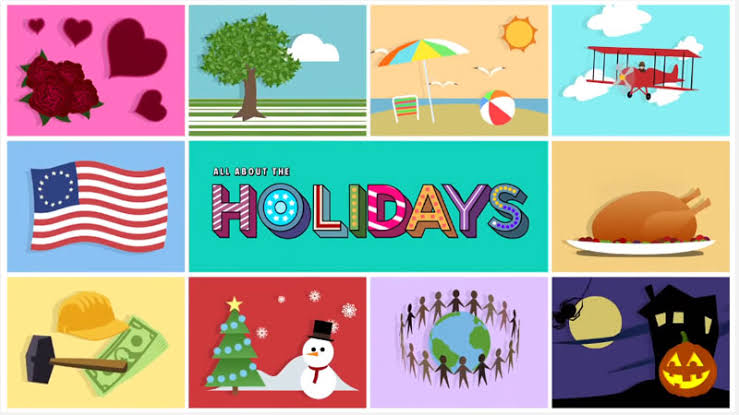As the year draws to a close, individuals and families eagerly anticipate the festive season, a time synonymous with joy, reflection, and cherished traditions. Public holidays during this period offer a much-needed respite from daily routines, allowing people to engage in celebrations, spend quality time with loved ones, and rejuvenate for the year ahead. These holidays are a significant part of many cultures and countries, bringing people together to celebrate historical, religious, or cultural milestones.
Understanding Public Holidays

Public holidays are designated days when governments recognize significant cultural, religious, or historical events. These days often result in the closure of government offices, schools, and many businesses, providing citizens with the opportunity to observe the occasion appropriately. Public holidays can be commemorative, reflecting important national events or celebrations, and they vary widely depending on the country or region. While public holidays are often viewed as a time for relaxation, they are also a time for reflection, unity, and engagement with community values.
In many countries, public holidays are an essential part of the social fabric, providing a shared occasion for individuals to participate in national or religious observances. These days serve as opportunities to take a break from the demands of everyday life, and the types of holidays observed often reflect a country’s history, culture, and people’s values.

Upcoming Public Holidays

As we approach the end of December 2025, several notable public holidays are on the horizon. Some of the most widely celebrated holidays include Christmas Day, Boxing Day, and New Year’s Day. These holidays are deeply embedded in cultural traditions and provide a chance for people to celebrate in unique ways.

- Christmas Day (December 25): Celebrated globally, Christmas commemorates the birth of Jesus Christ and is marked by religious services, festive meals, and the exchange of gifts. This holiday is one of the most anticipated events of the year, with communities coming together for church services, festive decorations, and meals that bring families closer. For many, Christmas is also a time to reflect on the past year, give back to the community, and appreciate the blessings they have.
- Boxing Day (December 26): Observed in many countries, particularly those with a British colonial history, Boxing Day has evolved from a day of giving to the less fortunate to a significant shopping event. The day is marked by large discounts in retail stores, making it one of the busiest shopping days of the year. Traditionally, it was a time when servants and tradespeople received gifts or “boxes” from their employers, a practice that has since morphed into the modern tradition of shopping and relaxation.
- New Year’s Day (January 1): Signifying the beginning of the new year, this day is celebrated with various customs worldwide. Fireworks, parties, and public events are common as people welcome the new year with open arms. It is a time for reflection on the past year and a moment to set resolutions and intentions for the year ahead. Many cultures have their own unique ways of marking this transition, including symbolic meals, rituals for good luck, and public gatherings.
Regional Variations and Additional Holidays
While Christmas, Boxing Day, and New Year’s Day are celebrated in many countries, other public holidays during this period reflect local customs, traditions, and cultural significance. These holidays can differ from one region to another, often shaped by historical events or religious observances that are unique to a particular area.
- Diwali: Known as the Festival of Lights, Diwali is a significant holiday in India and among Indian communities worldwide. In 2025, several U.S. states have recognized Diwali’s cultural importance by declaring it a public holiday, allowing for broader participation in the festivities. Diwali symbolizes the victory of light over darkness, good over evil, and knowledge over ignorance. Families celebrate with lights, prayers, and the sharing of sweets, creating a sense of community and joy.
- Election Days: In some countries, election days are declared public holidays to encourage voter turnout. For example, South Africa has a history of declaring election days as public holidays to facilitate citizens’ participation in the democratic process. On these days, citizens are encouraged to vote, and businesses typically close early or operate under special schedules.
Implications for Businesses and Services
Public holidays have significant implications for various sectors of society. They can impact business operations, public services, and transportation schedules. Understanding these changes helps both employees and employers plan accordingly during these times of celebration.
- Retail: Public holidays like Christmas and Boxing Day often lead to increased consumer spending. Retailers extend their hours leading up to these holidays to accommodate the high volume of shoppers. Boxing Day, in particular, is a retail extravaganza, with major sales and discounts attracting customers. However, businesses may close on the holiday itself, requiring consumers to plan their shopping in advance. Small businesses may also adapt by offering special holiday promotions to remain competitive during this busy period.
- Public Services: While public offices and services typically close on most public holidays, essential services like healthcare, emergency services, and transportation remain operational. These services adjust staffing schedules to ensure coverage, and emergency response systems continue to function without interruption. On days like Christmas and New Year’s Day, people may experience delays or limited access to certain services, so it’s important to plan ahead and check for any changes in availability.
- Transportation: Public holidays can lead to altered transportation schedules. Buses, trains, and flights may operate on reduced schedules, while others may be completely booked due to high demand. Travelers should be mindful of these changes and plan their journeys in advance. It’s always a good idea to check transportation websites or apps for real-time updates on schedules and availability.
Employee Entitlements and Considerations
When public holidays fall on weekdays, employees are often entitled to specific benefits, depending on the laws in their country or region. These entitlements typically revolve around holiday pay and time off, ensuring employees are fairly compensated for their work during these special days.
- Holiday Pay: Employees who are required to work on public holidays are often entitled to additional compensation, known as holiday premium pay. In many cases, this premium pay may be equal to or greater than their regular pay rate, depending on local labor laws and company policies. For instance, employees may receive double-time or time-and-a-half pay for working on major holidays like Christmas or New Year’s Day.
- Time Off: If a public holiday falls on a weekend or another non-working day, many companies offer employees a substitute day off, known as a “holiday in lieu.” This ensures that workers still receive the benefit of the public holiday. It is important for employees and employers to understand the specific holiday entitlements within their jurisdiction to avoid confusion and ensure fair treatment during the holiday season.
Cultural Significance and Traditions
Public holidays are deeply embedded in cultural and religious traditions, providing an opportunity to connect with family, friends, and the community. These traditions help preserve cultural heritage and provide a sense of continuity and shared identity across generations.
- Christmas Traditions: From decorating Christmas trees to attending religious services, Christmas is filled with time-honored traditions that vary across cultures. In some countries, people exchange gifts, while in others, the focus may be more on family gatherings or acts of charity. Regardless of the specifics, Christmas is a time for people to come together, show love and appreciation, and create memories that last a lifetime.
- New Year’s Celebrations: New Year’s Eve celebrations are another example of how public holidays bring people together. Across the globe, people celebrate with fireworks, concerts, and countdowns. In many cultures, special foods are eaten, such as black-eyed peas in the U.S. South or grapes in Spain, each symbolizing good fortune for the coming year.
Planning and Preparation
To make the most of the upcoming public holidays, it’s essential to plan ahead. The increased demand for services, transportation, and shopping can cause stress and confusion if not properly managed.
- Check Local Schedules: Businesses, schools, and public services often alter their hours around public holidays. Checking local schedules helps ensure that you aren’t caught off guard. Many companies announce changes in their hours, so it’s essential to stay informed.
- Plan Activities: Whether you plan to travel, host a holiday gathering, or take part in a community event, advanced preparation helps make the most of the time off. Booking travel early can help secure better rates, and making reservations for meals or events can avoid last-minute disappointments.
- Stay Informed: Official government websites or news sources often announce changes related to public holidays, especially if there are new or additional holidays declared. Keeping an eye on these sources ensures you don’t miss important updates.
Conclusion
Public holidays offer a valuable opportunity to pause, celebrate, and connect with others. Whether observing religious customs, celebrating cultural milestones, or simply taking time off to relax, these holidays allow us to reflect on the year that has passed and look forward to the future with hope and excitement. By understanding the significance of these days and planning accordingly, individuals can embrace the holiday season with joy, gratitude, and a sense of unity.
Do follow Uae stories for more update
check out Faisal a rising star














